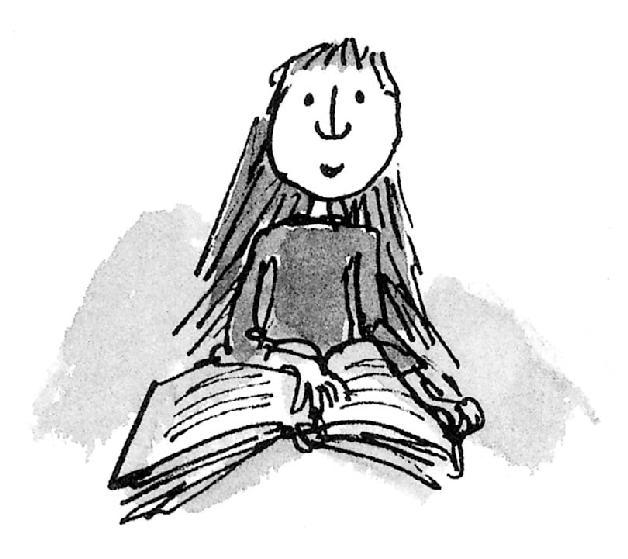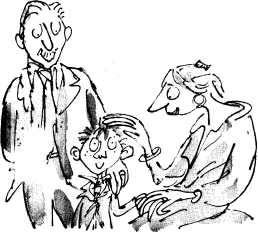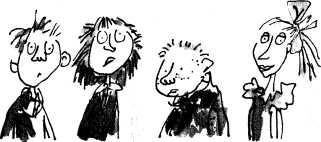
The Reader of Books
It's a funny thing about mothers and fathers. Even when their own child is the most disgusting
little blister1 you could ever imagine, they still think that he or she is wonderful.
Some parents go further. They become so blinded by adoration2 they manage to convince
themselves their child has qualities of genius.
Well, there is nothing very wrong with all this. It's the way of the world. It is only when the
parents begin telling us about the brilliance3 of their own revolting offspring, that we start shouting,
"Bring us a basin! We're going to be sick!"

School teachers suffer a good deal from having to listen to this sort of twaddle from proud parents,
but they usually get their own back when the time comes to write the end-of-term reports. If I were
a teacher I would cook up some real scorchers for the children of doting4 parents. "Your son
Maximilian", I would write, "is a total wash-out. I hope you have a family business you can push
him into when he leaves school because he sure as heck won't get a job anywhere else." Or if I
were feeling lyrical that day, I might write, "It is a curious truth that grasshoppers5 have their
hearing-organs in the sides of the abdomen6. Your daughter Vanessa, judging by what she's learnt
this term, has no hearing-organs at all."

I might even delve7 deeper into natural history and say, "The periodical cicada spends six years as a
grub underground, and no more than six days as a free creature of sunlight and air. Your son
Wilfred has spent six years as a grub in this school and we are still waiting for him to emerge from
the chrysalis." A particularly poisonous little girl might sting me into saying, "Fiona has the same
glacial beauty as an iceberg8, but unlike the iceberg she has absolutely nothing below the surface."
I
think I might enjoy writing end-of-term reports for the stinkers in my class. But enough of that.
We have to get on.
Occasionally one comes across parents who take the opposite line, who show no interest at all in
their children, and these of course are far worse than the doting ones. Mr and Mrs Wormwood
were two such parents. They had a son called Michael and a daughter called Matilda, and the
parents looked upon Matilda in particular as nothing more than a scab. A scab
is something you have to put up with until the time comes when you can pick it off and flick9 it
away. Mr and Mrs Wormwood looked forward enormously to the time when they could pick their
little daughter off and flick her away, preferably into the next county or even further than that.
It is bad enough when parents treat ordinary children as though they were scabs and bunions, but
it becomes somehow a lot worse when the child in question is extraordinary,
and by that I mean sensitive and brilliant. Matilda was both of these things, but above all she was
brilliant. Her mind was so nimble and she was so quick to learn that her ability should have been
obvious even to the most half-witted of parents. But Mr and Mrs Wormwood were both so
gormless and so wrapped up in their own silly little lives that they failed to notice anything
unusual about their daughter. To tell the truth, I doubt they would have noticed had she crawled
into the house with a broken leg.
Matilda's brother Michael was a perfectly10 normal boy, but the sister, as I said, was something to
make your eyes pop. By the age of one and a half her speech was perfect and she knew as many
words as most grown-ups. The parents, instead of applauding her, called her a noisy chatterbox
and told her sharply that small girls should be seen and not heard.
By the time she was three, Matilda had taught herself to read by studying newspapers and
magazines that lay around the house. At the age of four, she could read fast and well and she
naturally began hankering after books. The only book in the whole of this enlightened household
was something called Easy Cooking belonging to her mother, and when she had read this from
cover to cover and had learnt all the recipes by heart, she decided11 she wanted something more
interesting.
"Daddy," she said, "do you think you could buy me a book?"
"A book?" he said. "What d'you want a flaming book for?"
"To read, Daddy."
"What's wrong with the telly, for heaven's sake? We've got a lovely telly with a twelve-inch screen
and now you come asking for a book! You're getting spoiled, my girl!"
Nearly every weekday afternoon Matilda was left alone in the house. Her brother (five years older
than her) went to school. Her father went to work and her mother went out playing bingo in a town
eight miles away. Mrs Wormwood was hooked on bingo and played it five afternoons a week. On
the afternoon of the day when her father had refused to buy her a book, Matilda set out all by
herself to walk to the public library in the village. When she arrived, she introduced herself to the
librarian, Mrs Phelps. She asked if she might sit awhile and read a book. Mrs Phelps, slightly
taken aback at the arrival of such a tiny girl unacccompanied by a parent, nevertheless told her she
was very welcome.
"Where are the children's books please?" Matilda asked.
"They're over there on those lower shelves," Mrs Phelps told her. "Would you like me to help you
find a nice one with lots of pictures in it?"
"No, thank you," Matilda said. "I'm sure I can manage."
From then on, every afternoon, as soon as her mother had left for bingo, Matilda would toddle12
down to the library. The walk took only ten minutes and this allowed her two glorious hours
sitting quietly by herself in a cosy13 corner devouring14 one book after another. When she had read
every single children's book in the place, she started wandering round in search of something else.
Mrs Phelps, who had been watching her with fascination15 for the past few weeks, now got up from
her desk and went over to her. "Can I help you, Matilda?" she asked.
"I'm wondering what to read next," Matilda said. "I've finished all the children's books."
"You mean you've looked at the pictures?"
"Yes, but I've read the books as well."
Mrs Phelps looked down at Matilda from her great height and Matilda looked right back up at her.
"I thought some were very poor," Matilda said, "but others were lovely. I liked The Secret Garden
best of all. It was full of mystery. The mystery of
the room behind the closed door and the mystery of the garden behind the big wall."
Mrs Phelps was stunned16. ''Exactly how old are you, Matilda?" she asked.
"Four years and three months," Matilda said.
Mrs Phelps was more stunned than ever, but she had the sense not to show it. "What sort of a book
would you like to read next?" she asked.
Matilda said, "I would like a really good one that grown-ups read. A famous one. I don't know any
names."
Mrs Phelps looked along the shelves, taking her time. She didn't quite know what to bring out.
How, she asked herself, does one choose a famous grown-up book for a four-year-old girl? Her
first thought was to pick a young teenager's romance of the kind that is written for fifteen-year-old
schoolgirls, but for some reason she found herself instinctively17 walking past that particular shelf.
"Try this," she said at last. "It's very famous and very good. If it's too long for you, just let me
know and I'll find something shorter and a bit easier."
"Great Expectations," Matilda read, "by Charles Dickens. I'd love to try it."
I must be mad, Mrs Phelps told herself, but to Matilda she said, "Of course you may try it."
Over the next few afternoons Mrs Phelps could hardly take her eyes from the small girl sitting for
hour after hour in the big armchair at the far end of the room with the book on her lap. It was
necessary to rest it on the lap because it was too heavy for her to hold up, which meant she had to
sit leaning forward in order to read. And a strange sight it was, this tiny dark-haired person sitting
there with her feet nowhere near touching18 the floor, totally absorbed in the wonderful adventures
of Pip and old Miss Havisham and her cobwebbed house and by the spell of magic that Dickens
the great story-teller had woven with his words. The only movement from the reader was the
lifting of the hand every now and then to turn over a page, and Mrs Phelps always felt sad when
the time came for her to cross the floor and say ; "It's ten to five, Matilda."
During the first week of Matilda's visits Mrs Phelps had said to her, "Does your mother walk you
down here every day and then take you home?"
"My mother goes to Aylesbury every afternoon to play bingo," Matilda had said. "She doesn't
know I come here."
"But that's surely not right," Mrs Phelps said. "I think you'd better ask her."
"I'd rather not," Matilda said. "She doesn't encourage reading books. Nor does my father."
"But what do they expect you to do every afternoon in an empty house?"
"Just mooch around and watch the telly."
"I see."
"She doesn't really care what I do," Matilda said a little sadly.
Mrs Phelps was concerned about the child's safety on the walk through the fairly busy village
High Street and the crossing of the road, but she decided not to interfere19.
Within a week, Matilda had finished Great Expectations which in that edition contained four
hundred and eleven pages. "I loved it," she said to Mrs Phelps. "Has Mr Dickens written any
others?"
"A great number," said the astounded20 Mrs Phelps. "Shall I choose you another?"
Over the next six months, under Mrs Phelps's
watchful21 and compassionate22 eye, Matilda read the following books:
Nicholas Nickleby by Charles Dickens
Oliver Twist by Charles Dickens
Jane Eyre by Charlotte Bronte
Pride and Prejudice by Jane Austen
Tess of the D'Urbervilles by Thomas Hardy23
Gone to Earth by Mary Webb
Kim by Rudyard Kipling
The Invisible Man by H. G. Wells
The Old Man and the Sea by Ernest Hemingway
The Sound and the Fury by William Faulkner
The Grapes of Wrath24 by John Steinbeck
The Good Companions by J. B. Priestley
Brighton Rock by Graham Greene
Animal Farm by George Orwell
It was a formidable list and by now Mrs Phelps was filled with wonder and excitement, but it was
probably a good thing that she did not allow herself to be completely carried away by it all.
Almost anyone else witnessing the achievements of this small child would have been tempted25 to
make a great fuss and shout the news all over the village and beyond, but not so Mrs Phelps. She
was someone who minded her own business and had long since discovered it was seldom worth
while to interfere with other people's children.
"Mr Hemingway says a lot of things I don't understand," Matilda said to her. "Especially about
men and women. But I loved it all the same. The way he tells it I feel I am right there on the spot
watching it all happen."
''A fine writer will always make you feel that," Mrs Phelps said. "And don't worry about the bits
you can't understand. Sit back and allow the words to wash around you, like music."
"I will, I will."
"Did you know", Mrs Phelps said, "that public libraries like this allow you to borrow books and
take them home?"
"I didn't know that," Matilda said. "Could I do it?"
"Of course," Mrs Phelps said. "When you have chosen the book you want, bring it to me so I can
make a note of it and it's yours for two weeks. You can take more than one if you wish."
From then on, Matilda would visit the library only once a week in order to take out new books and
return the old ones. Her own small bedroom now became her reading-room and there she would
sit and read most afternoons, often with a mug of hot chocolate beside her. She was not quite tall
enough to reach things around the kitchen, but she kept a small box in the outhouse which she
brought in and stood on in order to get whatever she wanted. Mostly it was hot chocolate she
made, warming the milk in a saucepan on the stove before mixing it. Occasionally she made
Bovril or Ovaltine. It was pleasant to take a hot drink up to her room and have it beside her as she
sat in her silent room reading in the empty house in the afternoons. The books transported her into
new worlds and introduced her to amazing people who lived exciting lives. She went on olden-day
sailing ships with Joseph Conrad. She went to Africa with Ernest Hemingway and to India with
Rudyard Kipling. She travelled all over the world while sitting in her little room in an English
village.

点击 收听单词发音
收听单词发音
 收听单词发音
收听单词发音
1
blister

|
|
| n.水疱;(油漆等的)气泡;v.(使)起泡 | |
参考例句: |
|
|
|
2
adoration

|
|
| n.爱慕,崇拜 | |
参考例句: |
|
|
|
3
brilliance

|
|
| n.光辉,辉煌,壮丽,(卓越的)才华,才智 | |
参考例句: |
|
|
|
4
doting

|
|
| adj.溺爱的,宠爱的 | |
参考例句: |
|
|
|
5
grasshoppers

|
|
| n.蚱蜢( grasshopper的名词复数 );蝗虫;蚂蚱;(孩子)矮小的 | |
参考例句: |
|
|
|
6
abdomen

|
|
| n.腹,下腹(胸部到腿部的部分) | |
参考例句: |
|
|
|
7
delve

|
|
| v.深入探究,钻研 | |
参考例句: |
|
|
|
8
iceberg

|
|
| n.冰山,流冰,冷冰冰的人 | |
参考例句: |
|
|
|
9
flick

|
|
| n.快速的轻打,轻打声,弹开;v.轻弹,轻轻拂去,忽然摇动 | |
参考例句: |
|
|
|
10
perfectly

|
|
| adv.完美地,无可非议地,彻底地 | |
参考例句: |
|
|
|
11
decided

|
|
| adj.决定了的,坚决的;明显的,明确的 | |
参考例句: |
|
|
|
12
toddle

|
|
| v.(如小孩)蹒跚学步 | |
参考例句: |
|
|
|
13
cosy

|
|
| adj.温暖而舒适的,安逸的 | |
参考例句: |
|
|
|
14
devouring

|
|
| 吞没( devour的现在分词 ); 耗尽; 津津有味地看; 狼吞虎咽地吃光 | |
参考例句: |
|
|
|
15
fascination

|
|
| n.令人着迷的事物,魅力,迷恋 | |
参考例句: |
|
|
|
16
stunned

|
|
| adj. 震惊的,惊讶的 动词stun的过去式和过去分词 | |
参考例句: |
|
|
|
17
instinctively

|
|
| adv.本能地 | |
参考例句: |
|
|
|
18
touching

|
|
| adj.动人的,使人感伤的 | |
参考例句: |
|
|
|
19
interfere

|
|
| v.(in)干涉,干预;(with)妨碍,打扰 | |
参考例句: |
|
|
|
20
astounded

|
|
| v.使震惊(astound的过去式和过去分词);愕然;愕;惊讶 | |
参考例句: |
|
|
|
21
watchful

|
|
| adj.注意的,警惕的 | |
参考例句: |
|
|
|
22
compassionate

|
|
| adj.有同情心的,表示同情的 | |
参考例句: |
|
|
|
23
hardy

|
|
| adj.勇敢的,果断的,吃苦的;耐寒的 | |
参考例句: |
|
|
|
24
wrath

|
|
| n.愤怒,愤慨,暴怒 | |
参考例句: |
|
|
|
25
tempted

|
|
| v.怂恿(某人)干不正当的事;冒…的险(tempt的过去分词) | |
参考例句: |
|
|
|
| 欢迎访问英文小说网 |

